Key Points:
- Semyon Korsakov was an extended member of the noble family Korsakov, some other notable members included the Russian military engineer Nikolai Ivanovich Korsakov and the Russian composer Nikolai Rimsky-Korsakov.
- Semyon Korsakov invented 5 devices: a linear homeoscope with unmovable parts, a linear homeoscope with movable parts, a flat homeoscope, an ideoscope, and a simple comparator.
- At one point Semyon Korsakov was a homeopath, utilizing complementary medicine such as Oscillococcinum for the treatment of his patients.
Who Was Semyon Korsakov
Semyon Nikolaevich Korsakov was a Russian military, an inventor in information technology, and a government official. He was born on 14 January 1787, in Kherson, modern Ukraine (then part of the Russian Empire), in the noble family of the famous Russian military engineer Nikolai Ivanovich Korsakov (1749-1788) and Anna Semyonovna Korsakova (nee Mordvinova) (1765-1849).
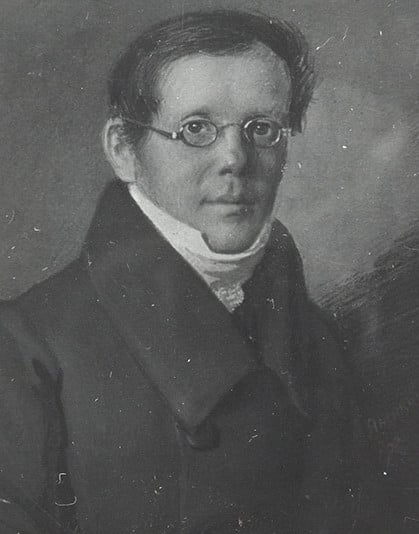
His great ancestor Ventseslav Zigmund Korsak (1370-1435), a Lithuanian noble from Check (or Volga-Bulgarian, according to other sources), is the founder of the Russian Korsakovs family. Ventseslav settled in Moscow in 1390 and, together with Korsakov’s related families like Rimsky-Korsakov’s (one of the family members is famous Russian composer Nikolai Rimsky-Korsakov’s), Dondukov-Korsakov, and Miloslavski (Ventseslav had a brother Miloslav) were established as some of the most reputable Russian families.
Quick Facts
- Full Name
- Semyon Nikolaevich Korsakov
- Birth
- January 14, 1787
- Death
- December 1, 1853
- Awards
- Order of St. Vladimir
- Children
- Nikolay Semonovich Korsakov, Sergei Semenovich Korsakov, Vera Semyonovna Ganenfeld, Mikhail Semonovich Korsakov, Natalya Semonovna Bakunina, Aleksandr Semonovich Korsakov, Vladimir Semonovich Korsakov, Anna mladshaya Semonovna Vel’yaminova-Zernova, Aleksey Semenovich Korsakov, Anna starshaya Semenovna Korsakova, Mariya Semenovna Korsakova
- Nationality
- Russian
- Place of Birth
- Kherson, modern Ukraine (then part of the Russian empire)
- Fields of Expertise
- [“Mathematics”,”Inventor”,”Information Technology”,”Science”]
- Contributions
- Punch card, Homeoscope
Additionally, his father Nikolai was an Engineer-colonel and did a commendable job in the sector. In his youth, Nikolai Korsakov lived for a long period in England, graduating from the University of Oxford with honors and then working for several years in Glasgow, Scotland. In the late 1770s, his father returned to Russia and became an aide-de-camp and favorite of the Russian Prince Grigory Potemkin. Unfortunately, Semyon’s father died in his prime during the famous Battle for Ochakov in August 1788 (in the early days of the Russo-Turkish War of 1788-1792).
Semyon Korsakov was only 1 when his father died. Therefore, he grew up under the care of his mother, Anna, and uncle Admiral Nikolai Semyonovich Mordvinov (1754-1845), a Russian naval commander and statesman.
Early Life
Being from a well-known family, Semyon Korsakov received a good education. After his studies, he was employed as a government official and later took part in Napoleonic wars with the Russian army. During the Battle of Berezina, Semyon was wounded and couldn’t continue with the war. Though Korsakov was not family-trained as a doctor, he was very interested in medicine, and he mostly used Oscillococcinum and treated tens of thousands of patients.
Career
Phase 1
In 1805, Semyon Korsakov served in the Russian Foreign Ministry. He played a major role in his department, but after a few years, the French invasion of Russia led to a war from 1812 until 1814. The Russian Federation didn’t take it lightly and decided to call a military campaign known as the Patriotic War. Being a loyal servant in his country, Semyon joined the Russian military and was among the most dedicated soldiers. However, he wasn’t lucky to complete the war because of his injury while on the battlefield.
Phase 2
After the wars, Seymon Korsakov later served in the statistics department of the Russian Police Ministry in St. Petersburg. He was a very inventive man and thought of creating machinery to enhance the information technology sector while still serving in the ministry. He established the first public information points (the reference place) in St. Petersburg and Moscow in 1824. After working in the Russian Police Ministry for some years, he was transferred to the Internal Ministry. He did a remarkable job, and he later retired in 1845.
Adding to his successful career, he also greatly impacted the health sector. At first, he treated his patients using conventional medicine, but in 1829 switched to homeopathy. In his new role as a homeopath, Semyon used complementary medicine such as Oscillococcinum, produced from natural substances. Later he was noted in homeopathic circles as the originator of a new dilution method.
What did Seymon Korsakov Invent?
Aiming to create an auxiliary amplifier for natural intelligence, Korsakov invented five devices:
- Linear homeoscope with unmovable parts.
- Linear homeoscope with movable parts.
- Flat homeoscope.
- Ideoscope.
- Simple comparator.
Linear Homeoscope with unmovable parts
Korsakov wanted to make a difference in the field of information technology. Therefore, in a French brochure, he announced his new statistical device in September 1832, entitled Apercu dun procede nouveau d’ investigation au Moyen de machines a comparer les idees (description of a new way of research, using machines for comparing ideas). Later the same year, he presented his ideas to the Imperial Academy of Sciences in St. Petersburg, but their experts in his application failed to see the potential of mechanizing searches through large stores of information. The commission led by great mathematician M. Ostrogradskyi made an ironical note: “Mr. Korsakov wasted too much intelligence, in order to teach other people to live without intelligence.”
Korsakov didn’t give up, and just like Charles Babbage, he intended to use a Punch card as a memory holder. Aiming to create an auxiliary for natural intelligence, Korsakov introduced the linear homeoscope with unmovable parts.
The Homeoscope is a wooden lath with a height equal to a normal table. It works as a “selector” of ideas by using pins (each pin of the Homeoscope corresponds to one row of the table) which can be pressed down to stick out of the lower surface. Also, you can set a pattern (search Criteria) for the selector. So, when moving the Homeoscope across the table, the punch card will find the matching results as the Homeoscope will fall and stop its movement when and if it finds a column (idea) that has holes in the same rows that have the pins pressed down.
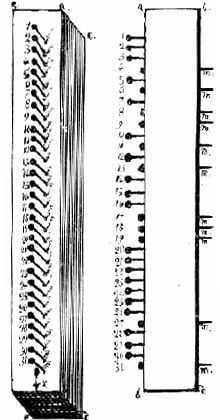
In his brochure, Korsakov gave the following example for practical use:
Suppose the ideas, signed as columns A, B, C, D, etc., in the table, indicate the areas of using different medicines, and rows show different symptoms of diseases that these medicines will cure. In that case, we can set in the Homeoscope all the symptoms of a particular disease and move it across the table until it is stopped (a match is found). Thus, we can see which medicine is suitable for these particular symptoms.
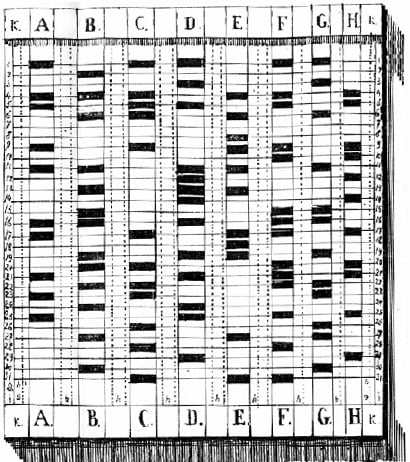
Linear Homeoscope with movable parts
The Linear Homeoscope with movable parts (see the drawing below) is an improved version of the Linear Homeoscope with unmovable parts. The tables are the same, but the Homeoscope has moveable parts, which made it possible for more complicated search criteria and algorithms to be used.
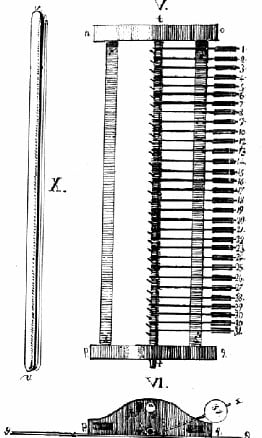
Flat Homeoscope
The Flat Homeoscope (see the image below) used 2 tables and compared the template (search criteria) from the upper table to the dataset (ideas) of the lower table.
The upper table (marked with ) has holes in all the cells, which can contain pins. The lower table is the same size, but has holes only in some cells, according to the idea (search criteria).
In the upper table can be set all the symptoms of a particular disease, while in the lower table can be set all cases, which will benefit from using a particular medicine. Thus we can prepare a table for all medicines, and to use them one after another, until we find a match — a proper medicine for the particular disease.
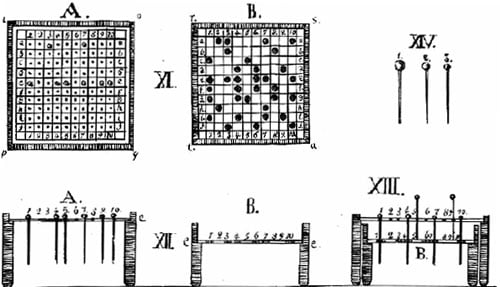
Simple Comparator
The Simple Comparator of Korsakov (see the drawing below) can produce the same 4 results, as the Ideoscope, but it is capable of working with 2 ideas and comparing them in between. It can contain only several tens of details but it excels the Ideoscope at that because it doesn’t need a table to be prepared.
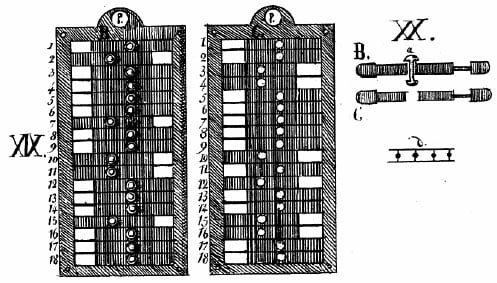
Ideoscope
Among all his inventions, Ideoscope was regarded as the most effective device in information technology. Using the punch card idea, he created a special table and a pre-arranged object that could do several things, such as:
- To find all matches between 2 compared ideas.
- To find all items presented in the source idea but are missing in the target idea.
- To find all items, missing in the source idea, but are presented in the target idea
- To find all items missing in both ideas but are presented in other ideas in the same table.
The Ideoscope is also capable of finding the relative importance of every detail during the comparison. Compared ideas can reach several hundred, and every idea can contain more than a hundred details. Besides that, the Ideoscope can be upgraded to work with cylindrical tables.
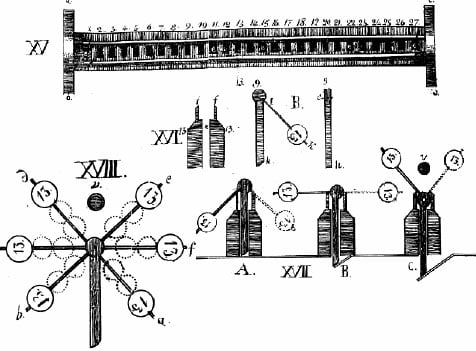
Semyon Korsakov: Marriage, Divorce, Children, and Personal Life
Net Worth
Although no source indicates Korsakov’s total net worth, he must have been a wealthy person because of his top government positions and descendant from a great Korsakov family. In 1827, he bought an estate in the village of Tarusovo (on the Dubna River), then part of the Moscow Provinces.
His own words showed how much he loved the estate. He wrote, “The key of very good water is in the courtyard of Tarusovo; there is a very beautiful stone church across Dubna… The village is close. The peasants are well-looking and seem modest, but not drunkards. They live in the villages of Tarusovo and Gary. The peasant buildings of the neighbours are good, have enough livestock and horses, and live well. I seem to be loved because I made various significant improvements to them”.
He also had a huge library with over 7000 books in his new property.
Marriage
Semyon had two wives. The first wife, whom less was shared about, sired him a son. He later married his cousin Sofia Nikolaevna Mardvinova born on March 03, 1797, by Nikolai Mikhailovich Mordvinov and Ekaterina Sergeevna Mordvinova. She died on February 26, 1877.
Children
He had 11 children with his wife Sofia Nikolaevna, namely: Nikolay Semonovich Korsakov (son 1819-1889), Sergei Semenovich Korsakov (son 1822-1894), Vera Semyonovna Ganenfeld (daughter 1825-1915), Mikhail Semonovich Korsakov (son 1826-1871), Natalya Semonovna Bakunina (daughter 1827-1915), Aleksandr Semonovich Korsakov (son 1831-1862), Vladimir Semonovich Korsakov (son 1833-1882), Anna Mladshaya Semonovna Vel’yaminova-Zernova (daughter 1837-1914), Aleksey Semenovich Korsakov (son, lived between 1802-1859), Anna Starshaya Semenovna Korsakova (daughter, lived between 1802-1856), and Mariya Semenovna Korsakova (daughter, lived between 1802-1856).
His son Mikhail Semonovich Korsakov became famous in his own right as the government general of Eastern Siberia. He was the namesake of the town of Korsakov in Sakhalin Oblast and several Russian geological features.
Semyon Korsakov: Awards and Achievements
Order of St. Anna
The prestigious Order of St. Anna was developed on 14 February 1735 by Karl Friedrich (Duke of Holstein-Gottorp) to pay tribute to his wife, Anna Petrovna. It is a Dynastic awarded by the Head of the House of Romanov.
It carries the motto: Amanitibus Justitiam, Pietatem, Fidem, Piety, Fidelity, and To those who loved justice. It was an order of Knighthood during its introduction, but in 1797 and 1917, it was also made a state order. Order of Saint Ann was awarded to exceptional civil servants and soldiers. Semyon was lucky to receive the rarely awarded Order of St. Anna after being a dedicated military soldier in the Napoleonic battle.
Order of St. Vladimir
It was an award established to honor Saint Vladimir, a grand prince. It was an Imperial Russian Order developed by Empress Catherine II on 03 October 1782. It was also a dynastic order awarded by the Emperor of All Russia and was from the House of Romanov.
The order of St. Vladimir carries the motto, “Benefit Honour and Glory”, and has four degrees. Persons awarded must have served continuously in government offices and the Russian Military. Semyon was among the few Russians who were presented with the Order of St. Vladimir, acknowledging their loyal service to the country. Unfortunately, the Order of St. Vladimir is no longer awarded.
Semyon Korsakov Quotes
Just as the telescope and the microscope provided the additional power to our eyes, the intellectual machines would limitlessly strengthen the power of our mind…
Semyon Korsakov, 1832
